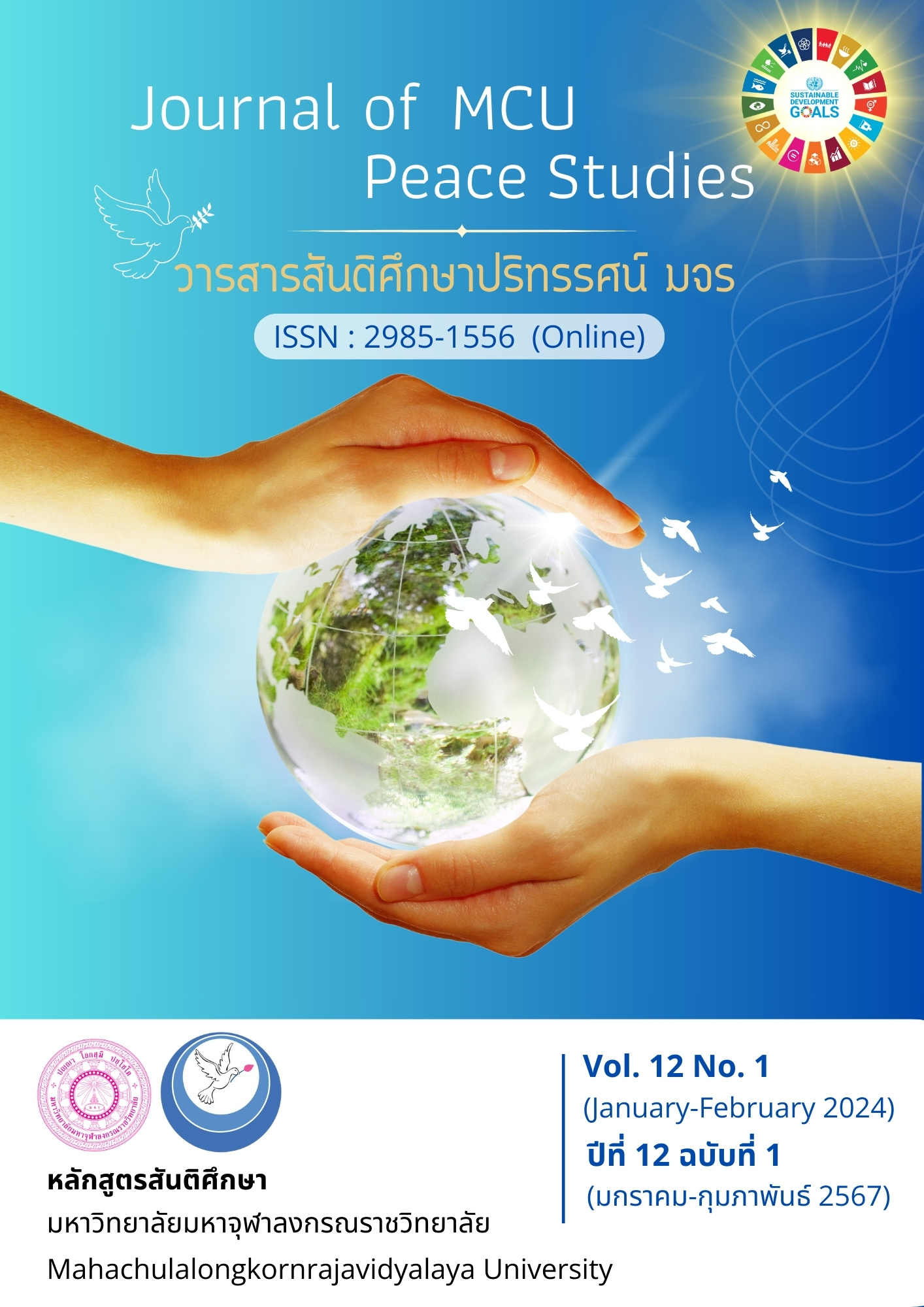Scenarios for the Development of Buddhist International Organization Networks for the Sustainable Propagation of Buddhism
Main Article Content
บทคัดย่อ
The research article consisted of the following objectives: 1) To study the investigate the context, problems, concepts, theories, and the Buddhist peaceful means conducive to the propagation of Buddhism by Buddhist international organizations during the year B.E. 2566 - 2575; and 2) To study the present a scenario for the development of Buddhist international organization networks for the sustainable propagation of Buddhism. The study employed Ethnographic Delphi Futures Research (EDFR) through in-depth interviews and a questionnaire. Key informants included experts on Buddhist international organizations in Thailand and other 13 countries, for a total of 25 persons. The obtained data were analyzed by median, mode, and interquartile range.
From the study, the following results are found:
1) Problems in the development of Buddhist international organization networks for the propagation of Buddhism arise from the Covid-10 situation and war, which lead to economic recession and effect on the propagation of Buddhism. Each organization has to adapt themselves by using technology and social media, as well as collaborating through network. The modern science theories that are used as the guidelines for developing the network include network management, risk management, and human resource management. The Buddhist peaceful means conducive to the development of Buddhist international organizations can be categorized into three Dhamma sections, namely (1) On organizational management including Padhāna (effort), Aparihāniyadhamma (conditions of welfare), Sārānīyadhamma (states of conciliation); (2) On the development of propagation work including Ovādapāṭimokkha (the fundamental teaching); and (3) On developing the inner peace of personnel including Ariyasacca (the four noble truths), Tisikkhā (the threefold learning), Gharāvāsa-dhamma (four virtues for a good household life), Iddhipāda (the four noble truths), Saṅgahavatthu (four bases of social solidarity), and Brahmavihāra (the four sublime states of mind), and
2) A scenario for the development of Buddhist international organization networks for the propagation of Buddhism consists of 8 components and 40 points which are identifying proactive vision and mission; Dhamma for proactive propagation; engaged Buddhism; inner peace; personnel potential development; communication, innovation, and technology; Buddhist network collaboration; and network organization development. A body of knowledge from the study is ‘Vision of Buddhist Scenario’.
Article Details

อนุญาตภายใต้เงื่อนไข Creative Commons Attribution-NonCommercial-NoDerivatives 4.0 International License.
ทัศนะและความคิดเห็นที่ปรากฏในบทความในวารสาร ถือเป็นความรับผิดชอบของผู้เขียนบทความนั้น และไม่ถือเป็นทัศนะและความรับผิดชอบของกองบรรณาธิการ ยินยอมว่าบทความเป็นลิขสิทธิ์ของวารสาร
เอกสารอ้างอิง
Committee of Sponsoring Organizations of the Treadway Commission. (2017). Enterprise Risk Management Integrating with Strategy and Performance Executive Summary. Retrieved July 28, 2022, from https://www.coso.org/SitePages/Home.aspx
Drucker, F. P. (2010). The Practice of Management. Bangkok: Expertnet.
Mahachulalongkornrajavidyalaya University. (1996). Pali Tripitaka. Bangkok: MCU Press.
Ngimruksa, A. (2019). The Scenario of Administration of Research Centers for Buddhist Studies in Asia. (Doctoral Dissertation). Silpakorn University. Bangkok.
Redram, V. (2019). Enterprise Risk Management in the 21st Century. Retrieved August 1, 2022, from http://journalgrad.ssru.ac.th/index.php/miniconference/article/view/2050
The Duddh. (2023). Somdej Phra Mahathirachan Reiterated in The Forum of the Thai Sangha Assembly in Japan to Propagate Buddhism is to Build Peace. Retrieved May 9, 2023, from https://thebuddh.com/?p=71035
Wat Prayurawongsawas Waraviharn. (2022). Prof. Dr. Phra Brahmapundit Who Gave a Lecture on “A Process of Building Peace in Buddhist Perspectives Based on Padhāna”. Retrieved October 3, 2022, from https://www.watprayoon.com/main.php?url=news_view&id=3238&cat=B&table=news
Wattanapradit, K. (2021). Local Peace Engineers: A Model of Leadership for Community Peace. Journal of MCU Peace Studies, 9(2), 446-457.
Yeamhongpapha, W., & Phra Suthirattanapundit. (2018). The Social Communication for the Learning Process Development of Buddhist Organization. (Doctoral Dissertation). Mahachulalongkornrajavidyalaya University. Ayutthaya.


